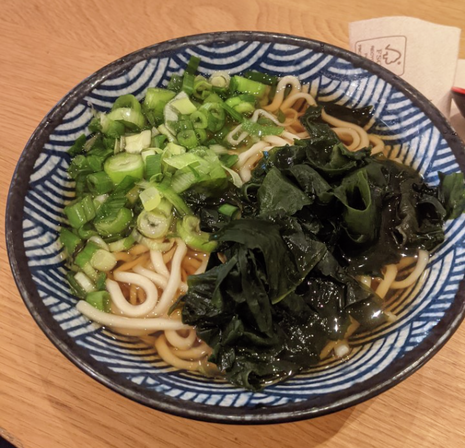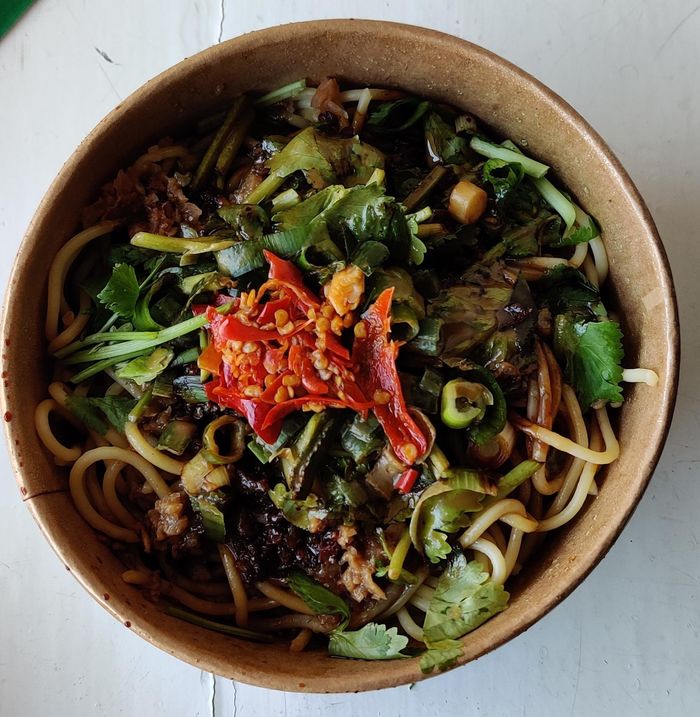Kineya Mugimaru is the hangover cure we’ve been waiting for
Food columnist George Carew-Jones reviews Kineya Mugimaru, a newly opened Japanese udon restaurant in Petty Cury.

For centuries, humanity has been searching for a cure. This is not a frivolous cure like the cure for hiccups or the cure for slow walkers (you know who you are) . Instead, this is the cure for a much more fundamental social problem. The reason why your accommodation smells of bacon on Sunday morning; some would argue, the major cause of the UK’s productivity problem. The cure we are searching for is, of course, the cure for a crippling, earth-shattering hangover.
Most of us have been there. You wake up, heart racing like you have just run a marathon when all you have actually been doing is lying prone in last night’s clothes with the light still on. At least you already hit your daily steps target by dirty dancing to Beyoncé past midnight in Revs. Surely there must be something you can do to stop this from happening again?
“A steaming bowl of hot noodles is, in my mind, the $4.67bn elixir that lifts even the worst aftereffects of drinking.”
Business agrees. A San Francisco consumer product research firm recently forecast the hangover cure market to grow to $4.67bn by 2028. Whether through arm patches or IV isotonic fluids, some of the best (read: financially motivated) scientists are working on this problem, but with little apparent success. The NHS claims that “hangover cures are generally a myth.”
I beg to differ.
It was the search for a proper hangover cure that brought me to Kineya Mugimaru. A Japanese udon restaurant founded in Osaka in 1967, ‘Kineya’ has only recently come to the UK, debuting in London in December 2020. The Cambridge branch was set up on Petty Cury over the summer, and with a well-sized dining room decked out in sleek pale wood décor, it presents as an enticing prospect.
A steaming bowl of hot noodles is, to my mind, the $4.67bn elixir that lifts even the worst aftereffects of drinking. Scientists and pseudoscientists across the board tend to agree on a few common principles when it comes to remedying a hangover. You need to be hydrated; you need minerals and salts to be replaced; and you need your energy to be boosted. I’d add that you also need your mate to tell you that you didn’t do anything embarrassing.
Kineya’s Kake udon with added nori did all of these things. It soothed, it nourished. It also took 10 minutes to arrive. Normally this would be fine, but Kineya is supposed to employ a rapid semi-self service concept. Slow service is in fact a common complaint I noticed on Google reviews for Kineya. At this point I will make an excuse for them – the first thing that you see when you walk in is a massive sign on the glass front advertising for staff. I imagine they are suffering from the same national worker shortage that is impacting other industries. As much as I would like to descend into a Brexit rant, I will save that for my forthcoming article on the weird obsession Cambridge pubs have with ales that have British bomber planes on them.
“This is fundamentally simplicity done well.”
Thoughts about service aside, I refocussed upon my dish. The udon themselves have a delightfully slimy texture and a deep, wheaty flavour that steps beyond what you often find elsewhere in the UK. This is somewhat unsurprising given that they are handmade on-site each day. The ‘Original’ broth, meanwhile, has a beautiful balance of saltiness and sweetness, with a depth that suggests there was no skimping on time during its creation. Any udon bowl at Kineya Mugimaru can also be customised by adding gyoza or tempura on top, the latter freshly deep fried behind the open counter, the former of unclear origin. It is worth noting that much of the fried meat and vegetable toppings are left under hot lamps on the display counter after being cooked, though – a sure way of taking the crispy edge off a decent tempura.
Beyond the udon focus, there are also classic teriyaki and katsu curry rice dishes, as well as a tonkotsu hybrid udon/ramen that is well worth pursuing for those who want a creamier kick to their noodle bowl. There is even a laksa dish, although I suspect that this one will not be found on the Kineya menu in Japan… This is fundamentally simplicity done extremely well – and a standard udon bowl will set you back no more than £5.60. Student Finance England will be delighted.
As I left Kineya, then, I felt satisfied. Not just because I had found a new satisfying midweek lunch venue, but more because my hangover was now a distant memory.
 Comment / Plastic pubs: the problem with Cambridge alehouses 5 January 2026
Comment / Plastic pubs: the problem with Cambridge alehouses 5 January 2026 News / New movement ‘Cambridge is Chopped’ launched to fight against hate crime7 January 2026
News / New movement ‘Cambridge is Chopped’ launched to fight against hate crime7 January 2026 News / Uni-linked firms rank among Cambridgeshire’s largest7 January 2026
News / Uni-linked firms rank among Cambridgeshire’s largest7 January 2026 News / SU stops offering student discounts8 January 2026
News / SU stops offering student discounts8 January 2026 News / Cambridge businesses concerned infrastructure delays will hurt growth5 January 2026
News / Cambridge businesses concerned infrastructure delays will hurt growth5 January 2026









